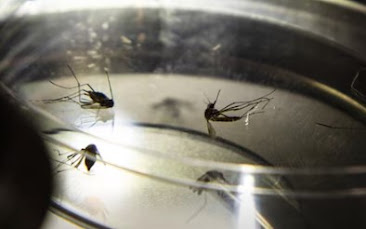Aedes Egypti mosquitoes carrying dengue fever
Arriving in Barbados in January to stay at Sugar Bay Resort, we were appalled to read The Barbados Nation newspaper that over 1,800 cases of dengue fever had been reported in the past three months. Mosquitoes were the culprit carriers so we were glad to have had the sense to book an all-inclusive hotel (Sugar Bay Resort) with fully air conditioned rooms (which mosquitoes can't tolerate). It basically amounted to a proactive move sparing us from a potentially deadly virus.
Getting Bajan breakfast morning after our arrivalDengue fever cases continue to decline but the numbers are still above the outbreak threshold.
In its most recent update, the Ministry of Health and Wellness stated that since the outbreak began in October 2023, four deaths have been recorded. It added that a number of people were referred to hospital with warning signs and some were hospitalised with severe dengue.
The predominant serotype identified has been type 2, followed by type 3.
Up to the week ending April 6, 2024, there were 2,915 clinically suspected, and 1,059 laboratory confirmed cases of dengue fever in Barbados. This compares to the same period in 2023, when there were only 158 suspected cases, and 105 confirmed cases.
The Ministry reported that the current outbreak peaked in January, this year, and continued to decline in March. Although lower than February, numbers are still above the outbreak threshold for March.
Health authorities have advised members of the public to implement measures to avoid contracting the illness, such as using repellent and wearing protective clothing; eliminating breeding sites by keeping their surroundings clean; and using protective window and door screens as well as mosquito nets, at home.
Barbados is not alone. 10 million people have fallen ill with dengue so far this year — an unprecedented surge that scientists say is fueled in part by climate change. Soaring global temperatures have accelerated the life cycles and expanded the ranges of the mosquitoes that carry dengue, helping spread the virus to roughly one in every 800 people on the planet in the past six months alone. An influx of patients has overwhelmed hospitals from Brazil to Bangladesh, recalling the worst days of the coronavirus pandemic.
Incredibly, dengue remains one of the world’s most neglected tropical diseases, according to the World Health Organization. Three out of four cases are mild or asymptomatic, making the illness difficult to track. And because the virus comes in four varieties, or serotypes, natural immunity after one illness does not protect against future infections with other types. What makes dengue unusual is that the risk of severe complications may actually increase with sequential infections of a different type.
Puerto Rico declared a public health emergency this spring, with more dengue cases reported in the first five months of 2024 than all of last year. Public health officials are bracing for the virus to crop up in more temperate regions, including the southernmost portions of the United States. Barbados was early in its own warnings from January, when we visited - and a record 8,000 people were deemed infected.
There is no cure for the virus, which in severe cases can lead to plasma leaking from veins, internal bleeding, organ failure and, in rare instances, death. Unlike other illnesses, vaccination is complicated. Few options are available, and few people know about them. The only vaccine available in the United States is for children 9 to 16 years old who have already been infected with dengue — those most vulnerable to hospitalization. But it won’t be available after 2026
The current
crisis in Puerto Rico (and Bim to a lesser extent) is a warning sign for the
rest of the United States. It shows how quickly an outbreak can metastasize in
communities with fragile infrastructure, underfunded health systems and
temperatures that get hotter with each passing year. Without drastic action to
control the virus and slow climate change, research suggests
some 2 billion additional people across the globe could be at
risk for dengue in the next 50 years.
WHO data show the Aedes aegypti is able to transmit diseases at higher temperatures than other mosquito species. In laboratory experiments, researchers have found that warmer conditions can make the insect grow faster, bite more people and lay more eggs.
Heat also makes the dengue virus more infectious and allows it to replicate faster inside its hosts. Models and real-world data show that these mosquitoes can transmit dengue at temperatures ranging from 64 to 94.1 degrees Fahrenheit. When we were in Barbados in January, we kept our room a/c set at a constant 62 degrees. Not one mosquito or bug of any kind emerged. Alas, for most Bajans a/c is a luxury they can't afford, though a small fraction are able to air condition a single bedroom - which helps.
Meanwhile, we do hope epidemiologists are working on a way to control this dangerous disease as it works its way north. The news on Janice's cousin: She recovered after 3 weeks, but still must take it easy.
See Also:


No comments:
Post a Comment